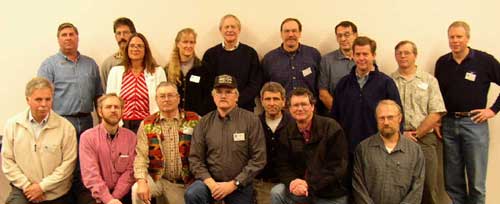Trinity River Advisory Group Formed
It didnít take long for the members of the newly formed Trinity Adaptive Management Working Group (TAMWG) to meet the challenge of providing recommendations to the US Department of Interior on the restoration of the Trinity River. The nineteen individuals appointed by the Secretary of the U.S. Department of Interior late last year have met four times this year.In February they elected long-time Trinity County resident Arnold Whitridge as chairman and Serge Birk, the Ecosystem Restoration Coordinator for the Central Valley Project Water Association, as vice-chairman.
 |
This past spring the Group reviewed a couple of key issues associated with the restoration of the Trinity River.
Spring Flows: Last year we had a normal amount of rainfall, but the Federal government is limited by a judgeís order to release into the Trinity River only the amount of water allocated for a dry year. The stakeholders recommended that scientists with the Restoration Program look for ways to use the limited amount of water to maximize the benefits to the river and its fisheries. The result was a slightly delayed release of the spring flows and keeping those flows for a longer period of time.
Proposed Budget and Strategic Plan: The stakeholders group reviewed the restoration programís draft strategic plan and the proposed budget for the upcoming year. They supported the overall concept and on a motion by Pat Frost, the RCDís Manager, requesting that the programís management team (the Trinity Management Council or TMC) specifically identify the importance of conducting restoration work in the tributaries of the Trinity River even when there are not adequate funds available to implement every high priority project.
Members of the Working Group represent a cross-section of agencies, organizations and groups that are not otherwise represented on the Trinity Management Council. These interests include, recreational and commercial fishing interests, commercial and recreational boaters, mining, power utilities, irrigators, forestry associations, farmers and ranchers and the general public. Ten of the members, including Frost, are residents of Trinity County.
According to Doug Schleusner, Executive Director of the Trinity River restoration Program, ďThe individuals on this advisory committee were selected, because of their knowledge of the Trinity River and its related issues, as well as their demonstrated ability to work collaboratively with competing interests."
Members of the Working Group (listed in alphabetical order) include: Serge Birk (Red Bluff), Central Valley Project Water Association; Jeffery Bryant (Mad River), American Forest Resource Council; Tim Colvin (Trinity Center), Trinity Lake Resort Owners Association; Edgar Duggan (Willow Creek), Willow Creek Community Services District; James Feider (Redding), Northern California Power Agency; Patrick Frost (Weaverville), Trinity County Resource Conmservation District; Zeke Grader (San Francisco), Pacific Coast Federation of Fishermen's Association); Dan Haycox (Junction City), Miners Alliance; Dana Hord (Big Bar), Big Bar Community Development Group; William Huber (Hyampom), South Fork Trinity River Coordinated Resource Management Planning Group; Kevin Lorenz (Douglas City), long-term local resident; Charles Schultz (Redding), Bureau of Land Management; Jimmy Smith (Eureka), Humboldt County Board of Supervisors; Dr. Elizabeth Soderstrom (Nevada city), Bay Delta Science Consortium and Environmental Water Caucus; James Outfitter and Guide Association; Arnold Whitridge (Douglas City), Safe Alternatives for Forest Environment.
Meetings of the Trinity Adaptive Management Working Group are advertised in local newspapers and are open to the public. For more information on the Working Group you can contact the local office of the Trinity River Restoration Program in Weaverville at 530-623-1800 or call
Pat Frost at the RCD at 530-623-6004.
This issue of the Conservation Almanac is being funded in part by grants from the
Trinity River Restoration Program, Trinity County Title III, and Sacramento Regional Foundation
|


